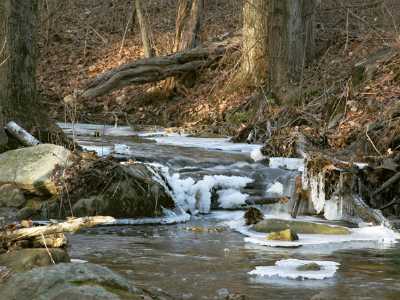

PHOTO COURTESY OF GARRY KESSLER
Winter in Westborough: Ice forms on a stream at the Bowman Conservation Area, Christmas Day 2004.
January 7, 2005, Page 4
NATURE NOTES
By ANNIE REID
Westborough Community Land Trust
Think you know nature?
Try this quiz
When you're hunkered down in the house, hiding from the cold, what can you do to escape winter and turn your thoughts to warmer and greener days? Take a nature quiz.
The main quiz below is a matching quiz. First is a list of of 13 phrases from the Nature Notes columns published in the News in 2004. Match the questions with a list of possible answers that follow, mostly names of plants and animals in Westborough.
If you're feeling ambitious, next try the "extra credit" part of the quiz. The answers that go with these last seven questions are not necessarily listed among the possible answers.
Check your answers in the Nature Notes Answer Key on page 21. The Answer Key also lists the past column that's relevant to each answer. To reread any of the past columns, look for them on the Westborough Community Land Trust web site at www.westboroughlandtrust.org/NatureNotes.php
Match these phrases with answers from the list below:
- It survives the winter using a kind of biological "antifreeze".
- It's brightly colored and poisonous.
- It's a native orchid.
- Its seedpods are fun to pop.
- It hunts from up high.
- It causes hay fever.
- It's an all-white plant.
- It has boot-shaped leaflets.
- It might be useful in mental health.
- Its flowers are the last ones in the woods in the fall.
- It's a notorious invasive species.
- It hunts by wading.
- It's a native holly in our wetlands.
"Extra credit" questions (with some but not all answers in the list above):
- What is the old English word for plant?
- Which two major rivers originate in Westborough? (Hint: One rises in Cedar Swamp, and the other flows out of the Headwaters Conservation Area.)
- Which creature's young develop into males or females depending on the temperature of their environment?
- What is Westborough's distinguishing natural feature?
- What do you call a landlocked pool of standing water that serves as a spring breeding ground for some kinds of frogs and salamanders but then usually dries up during the summer?
- Which plant produces male flowers when young, female flowers (and berries) in its prime, and male flowers again when it's old?
- From whom did early settlers in New England learn medicinal uses of native plants?
Possible answers:
- Blue-eyed grass (Sisyrinchium species)
- Blue flag iris (Iris versicolor)
- Butter-and-eggs (Linaria vulgaris)
- Christmas fern (Polystichum acrostichoides)
- Closed gentian (Gentiana clausa)
- Fly agaric (Amanita muscaria)
- Goldenrod (Solidago species)
- Great blue heron (Ardea herodias)
- Indian-pipes (Monotropa uniflora)
- Jack-in-the-pulpit (Arisaema triphyllum)
- Jewelweed (Impatiens capensis)
- Painted turtle (Chrysemys picta)
- Pink lady's-slipper (Cypripedium acaule)
- Purple loosestrife (Lythrum salicaria)
- Ragweed (Ambrosia artemisiifolia)
- Red-tailed hawk (Buteo jamaicensis)
- Snapping turtle (Chelydra serpentina)
- St. Johnswort (Hypericum perforatum)
- Winterberry (Ilex verticillata)
- Witch-hazel (Hamamelis virginiana)
- Wood frog (Rana sylvatica)
Go to Answer Key on page 21.
Date index
Month (January)
Common name index
Scientific name index
Category index